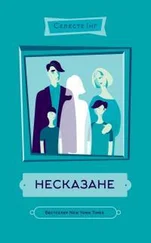At the stove, Mia pretended to busy herself with opening a tea bag. Lexie shook her head. “Stay,” she said. “It’s fine. I’m fine. Just—stay.”
After a moment, Izzy slid a square of paper across the table, and Lexie took it and began to follow her sister’s lead: folding over, back, to the center, out, until at last she took hold of the corners and pulled and a crane bloomed like a pale flower in her hands.

“Judge Rheinbeck says he’s not yet ready to make a decision,” Mr. Richardson told Mrs. Richardson the last week of April. Harold Rheinbeck was sixty-nine, gray haired, a longtime boxing fan, and an enthusiastic recreational hunter, but he was a sensitive man, too, and well aware of the intricate emotional complexities of the case. Over the past month, since the hearing had ended, he had in fact spent nights lying awake for hours thinking about little May Ling–Mirabelle, as he thought of her—trying to be scrupulously fair, every time he heard one name he appended the other in his mind, and for him the two names had firmly blended into one. Because the baby herself was in the care of a sitter and not present—infants being notoriously indisposed to long hearings—Ed Lim had wisely blown up a photograph and placed it on his prep table, and everyone in the court had been staring at it every day. As a result, the judge pictured her small face as he mulled over each day’s testimony, and the more he thought about it, the more undecidable the case became. He felt a sudden, intense sympathy for King Solomon, and each morning, short on sleep and uncomfortable in mind, he barked unfairly at his clerks and his secretary without even realizing why.
“It’s agony,” Mrs. McCullough said to Mrs. Richardson over a commiserating cup of coffee. They were, as usual, in Mrs. McCullough’s home, to avoid scrutiny. “What else does he want? How can this be a hard decision?” The baby monitor on the table beside them crackled, and she adjusted the volume slightly higher. Both women fell silent, and the quiet sound of Mirabelle’s sleeping breathing filled the kitchen.
“Can you think of anything else you could tell the judge?” Mrs. Richardson asked. “Things that give more context. Other factors for him to weigh.” She leaned forward. “Can you think of anything else you and Bill haven’t brought up? Reasons you’d be the better choice for custody? Or—” She hesitated, then plunged in anyway. “Or other reasons Bebe might be unfit? Anything at all.”
Mrs. McCullough nibbled one fingernail. It had been her nervous habit as a child, and Mrs. Richardson noticed she’d been doing it again of late. “Well,” she began, then stopped. “It’s probably not true.”
“This might be your last chance, Linda,” Mrs. Richardson said gently. “Anything you’ve got, we’d better throw at them.”
“It’s only a suspicion. I don’t have any proof.” Mrs. McCullough sighed. “About three months ago, I noticed that Bebe seemed—plumper. Her face got rounder and rounder, I noticed that particularly, when she came with the social worker to pick up Mirabelle. And her—her chest. And the social worker told me something strange. She said that on one of their visits around then, Bebe had to run off to the bathroom suddenly. They were at the library and she suddenly handed Adrienne the baby and dashed off. Adrienne said she heard Bebe throwing up.” Mrs. McCullough looked up at Mrs. Richardson. “It just made me wonder if she might have been pregnant. She seemed so incredibly exhausted then, too. I just had this hunch. There’s a look women get—you can see it, if you look. All these years, all this time we were trying, and one after another of my friends got pregnant—every time, I knew before they told me. I knew every time you were pregnant. Didn’t I, Elena?”
“You did,” said Mrs. Richardson. “Every time, you knew. Before I’d said a word.”
“And then, about a month ago, she suddenly went back to normal. Her face flattened out again. Back to being skinny and straight as a rail. I wondered.” Mrs. McCullough took a deep breath. “I wondered if she might have been pregnant, and then ended it.”
“An abortion.” Mrs. Richardson settled back in her chair. “That’s a big accusation.”
“I’m not accusing,” Mrs. McCullough insisted. “I told you, I don’t have proof. Only a suspicion. And you said anything. ” She sipped her coffee, which had gone cold. “If she had had an abortion, would that change anything?”
“Maybe.” Mrs. Richardson considered. “Having an abortion doesn’t make her a bad mother, of course. Though it would likely turn public opinion against her, if the news got out. People don’t like to hear about abortions. And an abortion while trying to get back a baby you abandoned?” She drummed her fingers on the table. “At the very least, it would suggest that she was careless enough to get pregnant again.” She took Mrs. McCullough’s hand and squeezed it. “I’ll look into it. See if there’s anything that might help. If there is, we can bring it up with the judge.”
“Elena,” Mrs. McCullough sighed. “You always know what to do. What on earth would I do without you?”
“Don’t say anything to Bill or Mark,” Mrs. Richardson said, gathering her purse. “Let’s not get their hopes up yet. Trust me. I’ll take care of everything.”
Bebe had not, in fact, been pregnant. Under the stress of the impending hearing, with news crews filming outside the restaurant one day and a journalist stopping her on the street to shove a microphone into her face the next, with a story about the case out every other day, it felt like, and her boss grumbling about the time she’d have to take off for the hearing—she had given in to junk food cravings: Oreos, French fries, once an entire bag of pork rinds, ballooning up fifteen pounds in a month. She’d put in extra hours to make up for the time she’d be taking off, working until two or three on the nights she closed and arriving at nine to open the next morning. That time, in her memory, existed only as a blur. And then she’d gotten food poisoning—a box of leftovers that had sat too long in the fridge—and thrown up right in the library, in front of the social worker. She hadn’t been able to eat for days afterward, and when she recovered, she found that, with the hearing mere weeks away, she was too nervous to eat. By the time the hearing began she had lost the extra fifteen pounds plus ten more.
Mrs. Richardson, however, knew none of this. With no way to prove a negative, she began, logically enough, by searching for evidence of the positive. She could find anything out, she reminded herself. Even if she didn’t know it herself, she had connections. The next morning, she pulled out her Rolodex and flipped to the M’s: Manwill, Elizabeth.
She and Elizabeth Manwill had been roommates freshman year in college, and though they’d found other roommates in later years, they’d stayed in touch, through graduation and afterward. They had reconnected when Elizabeth moved to Cleveland and became the head of a medical clinic just east of Shaker Heights—the only clinic on the East Side, it happened, that provided abortions.
It was a small thing Mrs. Richardson wanted to ask: a small, illicit, slightly illegal thing. Could she check the clinic’s records and see if Bebe Chow’s name appeared in the list of recent abortions? “Unofficially. Off the record,” Mrs. Richardson assured her friend, tucking the phone receiver against her shoulder and double-checking that her office door was shut.
“Elena,” Elizabeth Manwill said, shutting her own office door. “You know I can’t do that.”
Читать дальше













